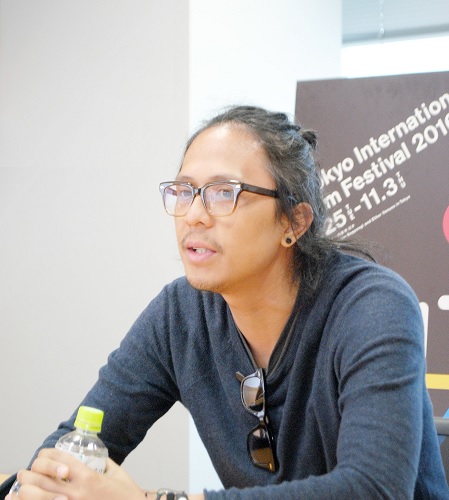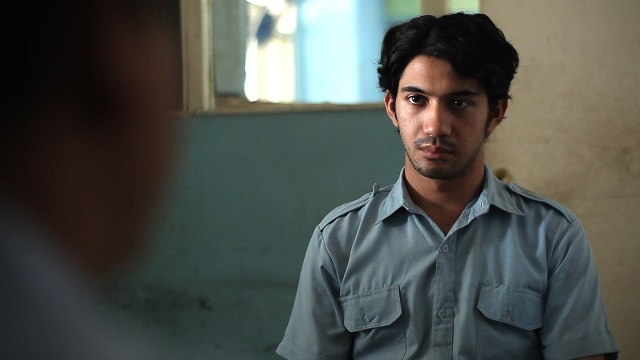Wanting to Show a Different Point of View on of Indonesian Life
Rieko Yui(hereinafter Yui): You were born in 1975, and I understand that many people from your generation were involved in the Reformasi*1 [Reformation] movement. Where were you during this period? Did you know about the Suharto regime?
*1 Hard hit by the Asian Currency Crisis in 1997, the Reformasi was a democratic movement in Indonesia fueled by nationwide dissent toward the developmental dictatorship of President Suharto that lasted for over thirty years. The movement was led by many citizens and university students, and forced Suharto to resign in 1998.
Teddy Soeriaatmadja (hereinafter Teddy): Well, I was actually studying at the University of London, and had returned right during the movement. Of course, I grew up during the Suharto regime so I notice the difference between that regime and the post-Reformasi period. But back then, although I had come back from London and witnessed the movement, I felt like a bystander because the Reformasi was led by students in Indonesia and I obviously wasn't there from the beginning.
Yui: Living in Indonesia now, do you still find yourself feeling like a minority or outsider? Maybe it has to do with the fact that you've lived outside of Indonesia for such a long time, but I feel that your films reflect your view as an outsider.
Teddy: No, not at all. I have always considered myself an Indonesian; by heart and by mind, I am Indonesian. So I've never considered myself an outsider. But I do agree that it's more about the point of view. I sometimes feel that I see things differently; that I have a view of Indonesia from the outside on the one hand, and from the inside on the other. In that sense, my point of view might be slightly different from others.

Yui: I think it is very different from those who have only been in Indonesia their entire lives.
Teddy: Yes. In this trilogy, I wanted to portray different points of view on Indonesian life, on Islam or even sensuality in Indonesia. And I think I was able to achieve it somewhat. I am not interested in portraying characters as saints or angels; I want to approach them in more humanistic, "real" way. I feel that's very different from other Indonesian films.
A Detailed Approach in Portraying Characters
Yui: I personally found your film approach to be very new. Do you think your studies in human ethology are reflected in your films?
Teddy: I don't quite know how it is reflected on my work or my scripts, but it helps me understand the characters. It helps me understand their personalities and relationships, and also how their ideas and feelings can change or become biased. I think it helps a bit in that sense.
Yui: In Something in the Way, you portrayed Ahmad, the protagonist, as someone who is a little sensitive; the way he cools his hot drinks with a fan, for instance. This kind of detailed portrayal of a character is really unique and I thought it derives from your study in human ethology.

Something in the Way
Teddy: Right. Well, that may be something that is unique to my films. It wasn't deliberate or intended, though; he, Ahmad, already has a different background than mine. But we did want to create a very sensitive character so, while we gave him minimum lines, we incorporated details that would make his character stand out.
Yui: This film is like a roller coaster ride, I think. It starts off slow with a monotonous atmosphere, but suddenly the story accelerates into a climax and goes up and down in full speed. It was a really shocking movie.
Teddy: We didn't want to portray violence itself; instead, we wanted to treat it like the feeling you get on a roller coaster. It is the same with sexuality: we did not want to portray sexuality itself. That's why everything is very mild and slow at the beginning but suddenly, in the second half, it all changes. Apparently, people who watched it said that it felt like they were watching two different films. That is exactly what I wanted the audience to experience.
Yui: In the film, Ahmad wears a mask. I thought it was a parody or pun on splatter movies. It reminds me of Friday the 13th (1980) directed by Sean S. Cunningham.
Teddy: Well, in the first draft of the script he wasn't wearing a mask in the execution scene. But I came to think that maybe he wanted to be someone else when he performed an act of violence. He wanted to change. So we added the mask to illustrate that. His thoughts and emotions behind the mask are unfathomable from its surface. So if you notice, when he takes off his mask, he starts panicking and throws up. While he is wearing the mask, however, he is very powerful, calm, and collected. Adding this element helped me to deepen the character.






